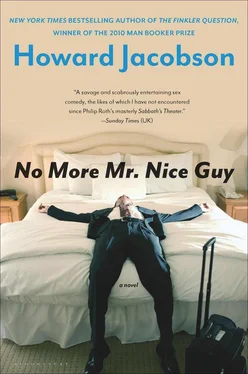Howard Jacobson
No More Mr. Nice Guy
‘GET OUT! JUST get out! Do it for yourself if you won’t do it for me. Take a holiday. Go away for a month. Go away for a year. You’ve had the best of my life. Can’t you find it in your heart to leave me to enjoy what little’s left of it?’
But what man can believe in his heart that a woman will enjoy her life without him?
‘Mel …’
‘Get out! Get the fuck out!’
He feels he is being attacked from the air. Buzzards are after him. Lean, ill-balanced, scraggy throated scavengers with torn wings and bleeding eyes.
Serves him right. Teach him to have loved the bird in the woman.
He sits in his study, his head on his desk, protecting his eyesight, amid the machinery indispensable to the smooth running of his life. The phones, the fax machine, the computers, the screens, the printer, the scanner, the photocopier, the batteries on charge, the tape recorder, the radio, the CD player, the strip-screen television, the laptop television, the VCRs, the manual typewriter in case of a power failure, the dictaphone in case of a manual failure. Only twelve months ago he had an electrician in to give him more sockets. ‘Enough to get me through to year fifteen of the new millennium.’ By which time civilisation will have discovered an alternative to electricity? No. By which time he will be dead. ‘Say two doubles on each wall?’ ‘Say three.’ Making eighteen in all, one wall being nothing but books. But already he needs more. Today every socket is in use, three with adaptors. Twenty-one plugs all warm and whirring at the same time.
‘Shut the fuck up or get the fuck out!’
The noise his room makes is part of the problem. He has the volume down on everything. The phones’ ringers are off. His laser printer is the quietest money can buy. He oils his office chair. He has rugs on his carpets. Nothing bleeps. If he is in his room when a fax is arriving — and when isn’t he in his room? — he throws a cushion over the machine to stifle the sound of the paper-cutter. He watches television all day. He can’t not watch television. Watching television is his job. ‘Wear fucking headphones, then!’ And he does. He sits in a creakless chair watching television all day, wearing fucking headphones, the gaps between his ears and the pads stuffed with tissues so that not a sound, not a squeak or a throb, can leak out and distract her from what’s left of her fucking life. If he could fit his halogen reading light with a silencer he would, God knows he would.
But the problem still isn’t solved. He fears that the problem can’t be solved. When she says he makes too much noise she means it ideologically. She can’t think with him in the house. She can’t think with him in her life. ‘Let’s face it,’ he says to her, ‘you can’t think with me in the fucking universe.’
‘Just try shutting your door,’ she tells him.
‘Ha!’ He laughs. As if one little door could fix it.
Everything is stopping her from concentrating. He is just part of the wider problem. It’s not personal. He can see that. Every adult female of her acquaintance feels as she feels. They can none of them think above the ceaseless racket of a masculinist universe: the humming of the spheres; the sizzle of static; the mad bleepings of car alarms — the assertion of men’s rights over men’s things.
But why can’t he just try shutting his door?
Ask him that and he’ll tell you that he’s keeping it open for her. So that she shouldn’t feel rejected by him. The truth is, though, that he’s the one who fears exclusion. He keeps his door open so that he can hear her moving about, hear her thinking, sighing. This isn’t jealousy. He isn’t straining his ears to catch her sighing for someone else. It’s devotion. Love. He’s fixated on her. He hears her breathe and he knows he’s alive. Close the door and he’s dead.
So that’s something else that’s preventing her from concentrating — the sound of him listening.
‘Stop that!’ she calls to him from her study.
‘Stop what?’
‘Stop listening to me!’
His point is that she couldn’t hear him listening if she weren’t so finely attuned herself. And by she he doesn’t just mean her, Mel, he means her sex.
‘You’ve turned yourselves into acoustic freaks,’ he tells her. ‘You’ve all got micro-hearing. You can hear yourselves fucking bleed …’
‘Bleed? Shows the age of the company you keep when you’re not at home. Women of my years don’t bleed.’
‘Doesn’t stop you listening.’
‘Frank, I’d leave the subject of blood if I were you.’
She’s starting to use his name. That’s how serious this is becoming.
‘Mel, you’re all out there tuning into the silent fucking spring. You can hear the grass grow. If I wasn’t here you’d be screaming at the fucking spiders for swallowing so loud.’
‘You go, I’ll deal with the spiders. I can tread on a spider.’
Go? Go where? Everything indispensable to the smooth running of his life is here.
She doesn’t use machines. Doesn’t hold with them. She writes her feministical-erotic novels long hand. When she’s interviewed about a book, which is rarely — since she finishes a book rarely — she says that slowness is of the essence. As with love-making so with prose-making. You can tell when a novel’s been written by mechanical means, she says. It lacks the pace of real life. The rhythm’s all wrong.
Like him. His rhythm’s all wrong. ‘In fact,’ she tells him, ‘you have no rhythm.’
‘You mean I don’t share yours.’
‘You don’t share anybody’s. When we first made love I used to wonder where you were. You seemed to be out there on your own, entirely solitary, going about your own private business.’
‘And later?’
‘What later?
He doesn’t say that her feministical-erotic heroines are all out there on their own, going about their private business, getting multiple orgasms as by right, without reference to whoever it is they’re getting them with. Or through. Or by. Or on. He doesn’t say that that’s the only thing that distinguishes them from pre-feministical-erotic heroines, who squandered their sexuality (whatever that fucking word means) fretting about what men wanted. That and the amount of inter-orgasmic intellectualising they do — these Serenas and Cybeles with cunts they can call their own and the conversation of Wittgenstein. It isn’t safe to talk about her work.
Just as it isn’t safe to talk about his.
‘What are you watching that crap all day for?’
He would like to say that it isn’t crap. That he doesn’t hold with snobbery about popular entertainment. But it is crap. And getting crappier. And he does hold with snobbery about popular entertainment. That’s the other reason for not looking beyond the year fifteen of the new millennium — there will be nothing left worth staying alive for.
He would also like to remind her that it’s his job. That he is the best television critic in the country. Or one of. That watching that crap all day is what pays the bills. That without his watching that crap all day she couldn’t afford the luxury of writing a hundred words a month. But that would take them back to talking about her work. Which isn’t safe. If he wasn’t sitting there with his door open watching that crap all day and listening to her listening to him listening to her, her output would be more like the hundred pages a month she was capable of before she knew he existed.
Not safe to talk about the time before she knew he existed.
Nothing’s safe. Now they are fighting over towels.
Читать дальше












